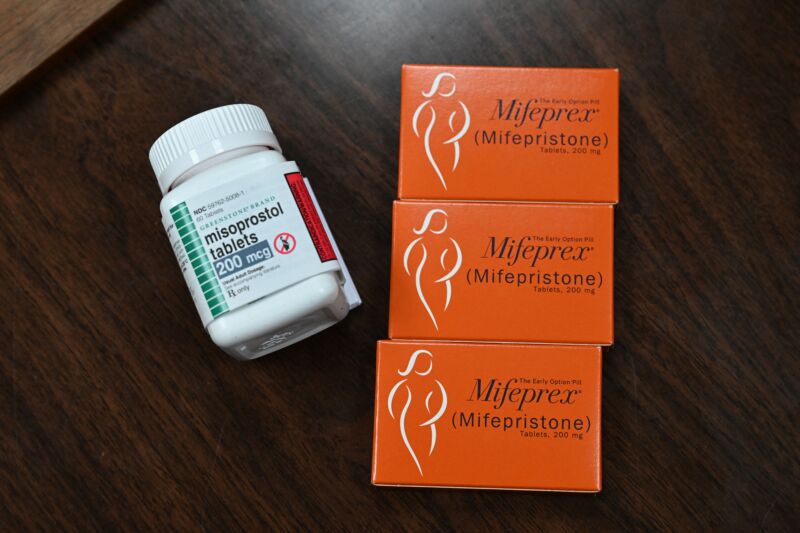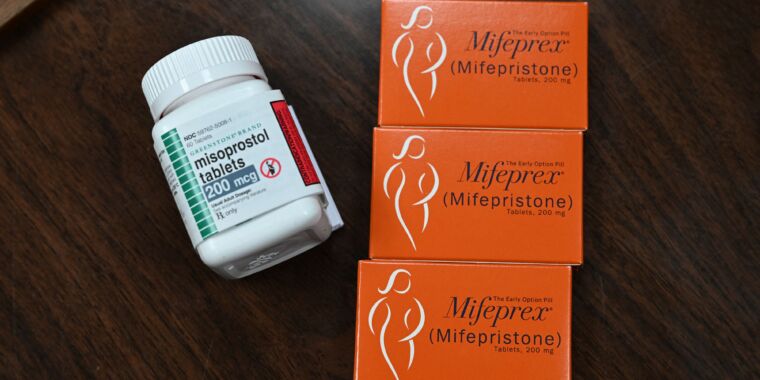SCOTUS rejects challenge to abortion pill for lack of standing
“Near miss” —
The anti-abortion defendants are not injured by the FDA’s actions on mifepristone.

Enlarge / Mifepristone (Mifeprex) and misoprostol, the two drugs used in a medication abortion, are seen at the Women’s Reproductive Clinic, which provides legal medication abortion services, in Santa Teresa, New Mexico, on June 17, 2022.
The US Supreme Court on Thursday struck down a case that threatened to remove or at least restrict access to mifepristone, a pill approved by the Food and Drug Administration for medication abortions and used in miscarriage care. The drug has been used for decades, racking up a remarkably good safety record in that time. It is currently used in the majority of abortions in the US.
The high court found that the anti-abortion medical groups that legally challenged the FDA’s decision to approve the drug in 2000 and then ease usage restrictions in 2016 and 2021 simply lacked standing to challenge any of those decisions. That is, the groups failed to demonstrate that they were harmed by the FDA’s decision and therefore had no grounds to legally challenge the government agency’s actions. The ruling tracks closely with comments and questions the justices raised during oral arguments in March.
“Plaintiffs are pro-life, oppose elective abortion, and have sincere legal, moral, ideological, and policy objections to mifepristone being prescribed and used by others,” the Supreme Court noted in its opinion, which included the emphasis on “by others.” The court summarized that the groups offered “complicated causation theories to connect FDA’s actions to the plaintiffs’ alleged injuries in fact,” and the court found that “none of these theories suffices” to prove harm.
Weak arguments
The anti-abortion medical groups, led by the Alliance for Hippocratic Medicine, argued that the FDA’s relaxation of mifepristone regulations could cause “downstream conscience injuries” to doctors who are forced to treat patients who may suffer (rare) complications from the drug. But the court noted that there are already strong federal conscience laws in place that protect doctors who refuse to participate in abortion care. Further, the doctors failed to provide any examples of being forced to provide care against their conscience.
The plaintiffs further claimed “downstream economic injuries” by way of having to divert resources from other patients and services. But the court flatly knocked down this argument, too, noting that the argument is “too speculative, lacks support in the record, and is otherwise too attenuated to establish standing.” Further, the organizations claimed that the FDA’s actions “caused” them to conduct studies and “forced” them to engage in advocacy and outreach efforts. “But an organization that has not suffered a concrete injury caused by a defendant’s action cannot spend its way into standing simply by expending money to gather information and advocate against the defendant’s action,” the Supreme Court ruled.
In a response to the ruling, reproductive health rights group National Institute for Reproductive Health blasted the lower courts’ actions that brought the case to the Supreme Court and described it as a warning. “This case should never have made it to the Supreme Court in the first place,” Haydee Morales, interim president of NIRH, said in a statement. “Anti-abortion operatives brought this case with one goal in mind—to ban medication abortion and they failed. This case was a near miss for the science and medicine community and it won’t be the last attack.”
SCOTUS rejects challenge to abortion pill for lack of standing Read More »
